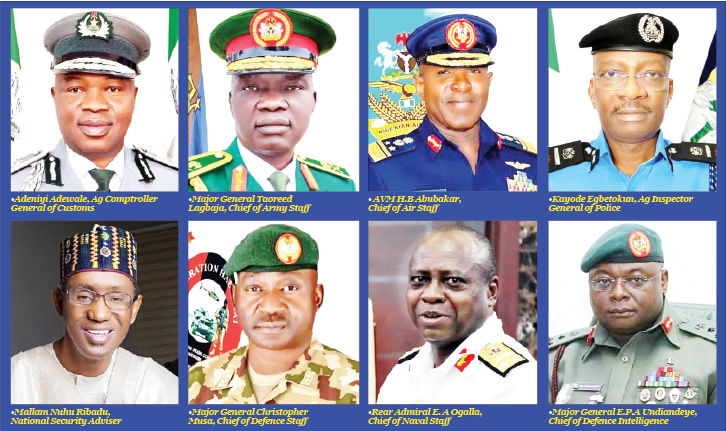The COVID-19 has indeed become the most significant reality of the twenty-first century. Its incidence seemed to have swallowed every other event that had hitherto began to define human lives since this century commenced. And one of the most significant human endeavor to be affected by this pandemic is public administration, and the public service which connects or disconnects citizens from qualitative welfare and well-being. Government everywhere is defined by three classical functions—policy management, regulatory and service delivery functions. The three functions are correlated and complementary in the attempt by every government to achieve good governance that transform the lives of the people. However, it is the service delivery function that represents the most visible dimension of government that connects them to the citizens. In other words, it is through the delivery of public services that the government could ever hope to undermine the infrastructural deficit that detract from making the lives of the people better.
Unfortunately, the COVID-19 pandemic struck most governments and their public administration dynamics at this critical service delivery point. And the tragedy of the pandemic is that it caught the entire world at varying administrative stages and phases of the normal. This is even worse for the third world countries, and Africa especially. Let me illustrate with the Nigerian public service. Before the COVID-19 lockdown, the Nigerian public service system had been afflicted by a bureau-pathological protocol defined by a collusion between what we all know as the “Nigerian factor” and some damaging systemic debilities. Nigeria inherited the British public service logic at independence. However, the introduction of the public service system and its frameworks and dynamics met a different cultural reality that had never been in sync. The inherited Weberian bureaucratic model rides on a one-model-fits-all service-wide standard operating framework encoded in the General Order (GO) that we now call the Public Service Rule (PSR).
This system, which Douglas McGregor calls “Theory X,” is founded on regulatory control, and the maintenance of law and order. Hence, it is easily suited for managing the “input-process” side of policy and programme implementation, but is essentially weak in managing the “output-outcome” results framework. Yet, since the emergence of the managerial revolution in the 1970s, the reform of the public service in most countries has been hinged around the modernization of the system in a way that institutionalizes performance management system, project management practices underpinned by monitoring and evaluation system, etc., and a pay structure that rewards performance and productivity and upgrades employees to strategic partners and assets in a whole value creation process managed through competency-based human resource management practices facilitated by professional HR managers. This is what McGregor calls “Theory Y” of public administration. It is therefore this move from Theory X to Theory Y that had been the focus of Nigeria’s public service reform efforts since independence. These efforts got to a head in 1974 when the Udoji Reform Commission was instituted to facilitate the modernization of the system from the Weberian bureaucracy to a performance management system that efficiently ensure productivity and service delivery. The Udoji Report was essentially neglected, and the public service system has remained mired in a dysfunctional state that could only produce infrastructural deficits.
The bureaucratic model of the Nigerian public service has therefore turned it into a great tideline that is managed through damage control. Smart public servants and government functionaries working for high stakes and high-end achievements within the ambit of the system operate through task force and ad hoc parallel structures or front-end project implementation units, which are by and large contraptions designed to side track the rigidities of a command and control bureaucracy. Unfortunately, and due to weak action research function in government, there is no sufficient flexibility or change orientation and competences to mainstream the practices that work in task force arrangement as smart or good practices and innovations to improve MDAs internal operating systems. The system did not only erode competency-based HR practices, there is also a poor sensitivity to reskilling to address capacity deficits in the dynamics of programmes and project implementation. As a result of the one-size-fit-all service-wide single standards and centralized governance controls for recruitment, promotion, postings, etc. and indeed the entire career management value chain, there is no public manager that has the full latitude that CEOs have in corporate settings to manage embedded politically induced behavior that limit performance effectiveness at the core of MDAs operations.
This exactly is the old administrative normal, and its inefficient dynamics, that the COVID-19 pandemic met Nigeria with. And the consequences for Nigerians have ranged from unmitigated disruption and economic recession to the loss of lives. The pandemic and the lockdown have effectively exposed the weaknesses and fault lines of the old administrative tradition that Nigeria, as well as some other countries in Africa, operates. Yet each country, like Nigeria, had to negotiate a governance path towards defeating the coronavirus, and safeguarding the lives and welfare of the citizens. and each country has had varying degree of success. The damage control was founded on quick-thinking leadership and the heroic sacrifices of frontline health workers and other public servants who had to brave the terror of engaging with the virus without the full compliments of personal protective equipment (PPE).
And now, as the Nigerian economy and society gradually reopen, the fundamental challenge is to properly now gain an efficient foothold for the public service in the new administrative normal in Nigeria. Put properly, the challenge is that of how to make the administrative dynamics of Nigeria sufficiently preemptive to anticipate a future pandemic, and the trouble generated by the economic recession and deep fiscal crisis instigated by COVID-19. And so with the sudden transformation of the way we look at work and the workplace dynamics, the public service had to forcefully embrace what used to be the staple of administrative conferences and forecasting. The “accidental agility” of the public service during this pandemic has to translate into a deep-seated administrative efficiency that will take the lead in making governance good and effective in a post-COVID-19 dispensation. Ironically, therefore, the tragedy of the pandemic and of Nigeria’s unpreparedness for it has presented the public service system with a unique opportunity to reflect on and rethink its governance and administrative policies. And the question is simple: how does the Nigerian public service work in the new administrative normal and under the omnipresent threat of the coronavirus?
And since the entire world and their institutional frameworks have been left reeling by the COVID-19, where will the roadmaps, models and benchmarks that will inform the transition to the new normal come from? A good way to answer these questions is that since several states have had distinct successes in certain significant institutional phases, a country like Nigeria will have to look inward and outward to generate a creative administrative response that will be uniquely Nigerian. Reform is not just about copying global best practices. On the contrary, it is about adoption and adaptation. I will identify several principles that should help foreground reform adaptation in a post-COVID-19 administrative era in Nigeria.
The first guiding principle for overcoming this period is “react today; think of tomorrow.” Countries that had been ravaged by the pandemic have had to call on some ingenious and creative means by which some temporary administrative reliefs could be achieved. This is commendable as a short-term measure to keep the coronavirus at bay. Yet, such measures must be undergirded by a more futurist situation analysis that generate alternative scenarios in anticipation of possibilities and uncertainties. This immediately speaks to the familiar four stages of “forming-storming-norming and performing” model of organization formation that enables any institution and organization to become efficiently formidable not only in dealing with a present challenge but also in anticipating future situations. This gives birth to the second principle of strategic and scenario planning, together with strategic communication. While the former explores “what-if” and “then-what” involved in forecasting the administrative future, the latter entail utilizing communication to help people understand the present crisis of the public service and its future possibilities by bringing them along on a journey grounded on data, evidence, action and impact, as a model of the future.
Thirdly, the new administrative normal requires a new professional skill and competency sets for navigating the administrative demands of a public service under the threat of a novel virus. This enables the public servants to bring multiple perspectives to policy challenges and public service delivery using foresight techniques to test different scenarios, and building resilience into policy design from potential shocks and unforeseen events. Fashioning new professional skills set involves several other requirements. First, it demands a human resources management architecture around which a new professionalism will be built. Second, this affect the way we reflect on the workplace, work structure and work dynamics that will affect the performance and productivity Nigeria needs. And thirdly, the professionalism must be undergirded by new culture and value changes that enable the public servants to focus on the new enabling values and ethos as well as helping them to think outside of the administrative box.
All this, in the final analysis, demands urgently that in the new administrative normal in Nigeria, a new breed of public managers who not only understand the demands of the knowledge age and the threat the coronavirus poses to the public service system, but are also significantly able to strategically unlearn, relearn and keep learning in order to understand the administrative responsibilities tomorrow requires. Such new leadership will learn to deploy strategic policymaking that exploits critical tools and systems thinking to utilize big-data for policy intelligence and analysis that reaches deep into the very essence of policies and their implementation.
Different stakeholders came together to salvage the nation under the emergency created by the pandemic. The public service must begin to think of how these networks will be strengthened to create greater and more integrated role for non-governmental entities in the spirit of ‘we are in it together’. The public service operating system will also need to be reconfigured to be more decentralized. In the transition period, working will be more of hybrid work and office physical presence. Working departmentally with differentiated schedules and territorial protection that is the culture of the old normal will be hard to sustain. Instead, supervisors will be required to put together inter-departmental and inter-ministerial teams to deal with issues. At some point, the service would necessarily have to start thinking of how to adjust very many extant policies, strategies, rules, regulations and procedures taking account of the emerging new normal. Much more urgent would be the issue of how the service will deepen the digital revolution to keep pace with the dynamics of an ever-changing reality.
Transiting to the new normal will not be easy. This is because the old normal is usually tempting, and change is difficult to navigate. But then we have no choice but to transit as the COVID-19 hold us tightly by the governance jugular and demands that we innovate administratively if we do not want to lose our lives. Reform is a serious business. And it has become a life-and-death issue that can no longer be left to the whims and caprices of political gambling. It is a very simple matter: if we do not innovate and modernize, we will die.
Being Webinar lecture delivered by Prof. Tunji Olaopa, retired Federal Permanent Secretary and Directing Staff at the National Institute for Policy and Strategic Studies – NIPSS, Kuru, Jos, at Seminar Organized by the Lagos State Ministry of Establishment, Training & Pension (tolaopa2003@gmail.com tolaopa@isgpp.com.ng)








